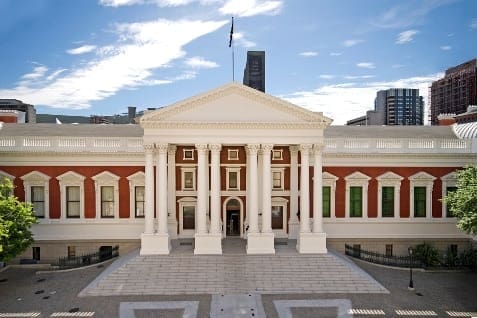South Africa’s parliament will resume its business with immediate effect after the Presiding Officers announced on Thursday that the leave period for Members of Parliament has been cancelled.
This follows the suspension of the programme of Parliament’s two Houses last month, as a precautionary measure to curb COVID-19 by drastically limiting the numbers of people at the precincts in Cape Town and at off-site parliamentary activities.
Briefing the media on the resumption of the business of Parliament on Thursday, Parliament Presiding Officers — National Assembly Speaker Thandi Modise and National Council of Provinces (NCOP) Chairperson, Amos Masondo — noted that despite the earlier suspension of the programme until further notice, Members of Parliament continued to work in the communities they represent, from 23 March to 13 April, as they fall under the category of essential services (in terms of South Africa’s COVID-19 nationwide lockdown regulations).
The Presiding Officers said they used this time to assess how Parliament could best resume its business after the constituency period and to benchmark best practices by other legislatures around the world in the fight against COVID-19.
“Consequently, we have taken a decision that the business of Parliament must resume with immediate effect, following conclusion of the constituency programme on 13 April.
“The leave period for MPs, which was scheduled from 28 April to 4 May, has been cancelled,” the Presiding Officers said.
The Presiding Officers emphasised that during the national lockdown and the extended period, social distancing is expected to continue for months.
To ensure that the execution of constitutional responsibilities continues uninterrupted, Parliament has been putting in place the necessary information and communications technology infrastructure to ensure its readiness for virtual meetings.
In the past few days, the officers said a number of virtual meetings have taken place. These include meetings of the Presiding Officers; forums of party chief whips of the National Assembly, the NCOP chief whip and provincial whips, and the Speakers’ Forum.
“These meetings have considered an amended framework for administering the business of oversight committees and plenary sittings, as well as an adjusted programme for the period ahead.
“Parliament will prioritise a schedule of virtual committee meetings, whose scope of oversight relates to government departments driving COVID-19 response measures.
“These committees will be required to intensify their oversight engagements, particularly on COVID-19 matters, and will conduct joint meetings,” the Presiding Officers said.
The officers added that Chief Whips represented in Parliament have agreed to draft guidelines and rules on how the virtual committee meetings and voting must be conducted.
“These are based on procedures, precedents, practices and conventions, which Parliament has developed over time. Sittings of two Houses will also have to take place during this period, and the Presiding Officers have framed rules to make provision for virtual House sittings.”
Virtual sittings of the National Assembly and the National Council of Provinces will deal with legislation and other matters needing approval or consideration from the Houses.
Questions for written reply and oral question and answer sessions with members of the Executive will be explored.
Division of Revenue Bill expected to be passed in June
Meanwhile, in processing the Division of Revenue Bill, which the National Assembly passed on 18 March, the officers said the NCOP and provincial legislatures will facilitate public involvement by calling for public submissions and holding virtual meetings.
“It is envisaged that the Bill will be passed on 2 June 2020,” the Presiding Officers said.
The possible revision of the Budget, in the wake of COVID-19, is also expected to be addressed through the established process of Parliament.
The Presiding Officers have welcomed the decision of the political parties in Parliament to support the COVID-19 Solidarity Fund, and they have also decided to donate one third of their monthly salaries for the next three months. – SAnews.gov.za

